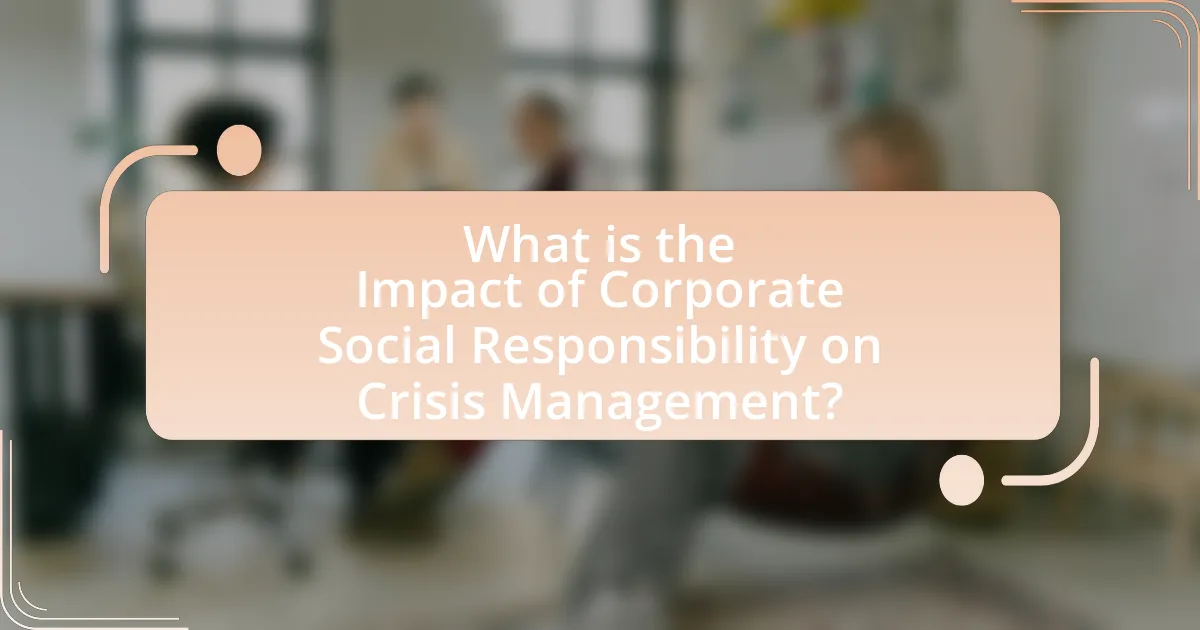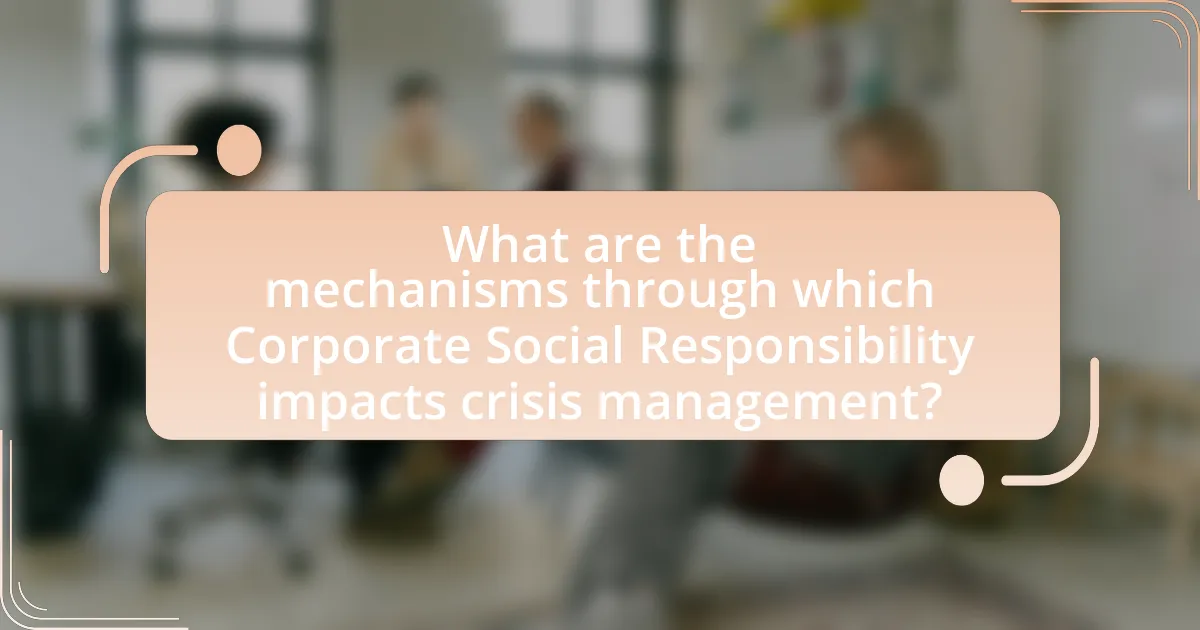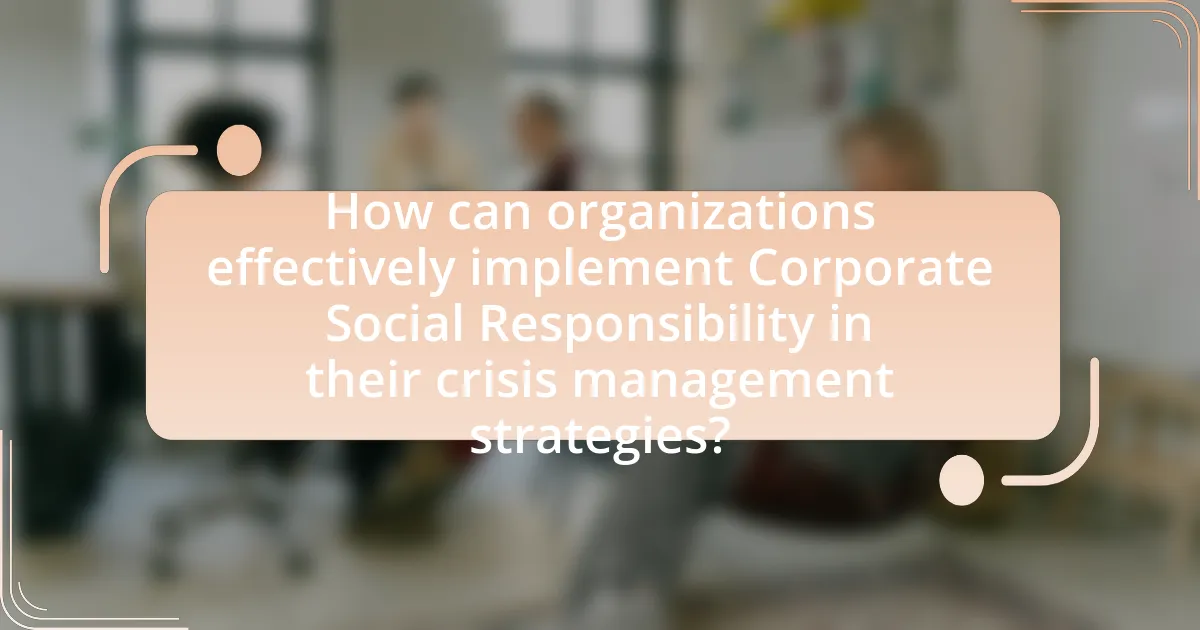Corporate Social Responsibility (CSR) plays a crucial role in enhancing crisis management by building trust and credibility among stakeholders. The article explores how CSR initiatives positively influence organizational resilience during crises, highlighting key elements such as stakeholder engagement, transparency, and ethical practices. It discusses the perception of stakeholders towards CSR during crises, the importance of effective communication strategies, and the mechanisms through which CSR impacts crisis outcomes. Additionally, the article addresses challenges in integrating CSR into crisis management and offers best practices for organizations to align their CSR efforts with crisis response strategies, ultimately demonstrating that a strong CSR framework can mitigate reputational damage and foster quicker recovery during challenging times.

What is the Impact of Corporate Social Responsibility on Crisis Management?
Corporate Social Responsibility (CSR) significantly enhances crisis management by fostering trust and credibility among stakeholders. When organizations actively engage in CSR practices, they build a positive reputation that can mitigate the impact of crises. For instance, a study by the Harvard Business Review found that companies with strong CSR initiatives are perceived more favorably during crises, leading to quicker recovery and less reputational damage. This relationship underscores the importance of CSR in preparing for and managing crises effectively.
How does Corporate Social Responsibility influence organizational resilience during crises?
Corporate Social Responsibility (CSR) enhances organizational resilience during crises by fostering trust and loyalty among stakeholders. When organizations actively engage in CSR initiatives, they build a positive reputation, which can lead to increased customer and employee loyalty. For instance, a study by the Harvard Business Review found that companies with strong CSR practices experienced less volatility in stock prices during economic downturns, indicating greater resilience. Additionally, organizations that prioritize CSR are often better equipped to respond to crises, as they have established networks and support systems within their communities. This proactive approach not only mitigates risks but also enables quicker recovery, demonstrating that CSR is a critical factor in enhancing resilience during challenging times.
What are the key elements of Corporate Social Responsibility that affect crisis management?
The key elements of Corporate Social Responsibility (CSR) that affect crisis management include stakeholder engagement, transparency, ethical practices, and community involvement. Stakeholder engagement ensures that organizations understand and address the concerns of those impacted by their operations, which is crucial during a crisis. Transparency fosters trust, allowing companies to communicate openly about issues and responses, thereby mitigating reputational damage. Ethical practices guide decision-making, ensuring that actions taken during a crisis align with societal values, which can enhance public perception. Community involvement demonstrates a commitment to social responsibility, which can lead to stronger support from the community during challenging times. These elements collectively contribute to effective crisis management by building resilience and maintaining stakeholder trust.
How do stakeholders perceive Corporate Social Responsibility during a crisis?
Stakeholders perceive Corporate Social Responsibility (CSR) during a crisis as a critical factor influencing their trust and loyalty towards a company. During challenging times, stakeholders expect organizations to demonstrate ethical behavior, transparency, and a commitment to social values, which can enhance the company’s reputation and mitigate negative impacts. Research indicates that companies actively engaging in CSR initiatives during crises can experience a 30% increase in stakeholder trust, as seen in the 2020 Edelman Trust Barometer, which highlighted that 71% of consumers believe businesses should take action to address social issues during crises. This perception underscores the importance of CSR in maintaining stakeholder relationships and ensuring long-term sustainability.
Why is Corporate Social Responsibility important in the context of crisis management?
Corporate Social Responsibility (CSR) is important in the context of crisis management because it enhances a company’s reputation and builds trust with stakeholders during challenging times. When a crisis occurs, organizations that have established a strong CSR framework are often viewed more favorably, as they are perceived to prioritize ethical practices and community welfare. For instance, a study by the Harvard Business Review found that companies with robust CSR initiatives experienced less negative impact on their stock prices during crises compared to those without such initiatives. This demonstrates that effective CSR can mitigate reputational damage and foster resilience, ultimately aiding in quicker recovery and maintaining stakeholder loyalty.
What role does Corporate Social Responsibility play in building trust with stakeholders?
Corporate Social Responsibility (CSR) plays a crucial role in building trust with stakeholders by demonstrating a company’s commitment to ethical practices and social accountability. When organizations actively engage in CSR initiatives, such as environmental sustainability, community development, and fair labor practices, they foster transparency and accountability, which are essential for stakeholder trust. Research by the Harvard Business Review indicates that companies with strong CSR programs experience higher levels of trust from consumers, as 64% of consumers are willing to pay more for products from socially responsible companies. This trust is further reinforced when stakeholders perceive that a company is genuinely invested in the welfare of society, leading to enhanced loyalty and support during crises.
How can Corporate Social Responsibility initiatives mitigate reputational damage during crises?
Corporate Social Responsibility (CSR) initiatives can mitigate reputational damage during crises by fostering trust and demonstrating accountability to stakeholders. When companies engage in CSR, they build a positive brand image that can act as a buffer during adverse events. For instance, a study by the Harvard Business Review found that companies with strong CSR practices experienced less stock price decline during crises compared to those without such initiatives. This indicates that proactive CSR efforts can enhance stakeholder loyalty and reduce negative perceptions, ultimately preserving the company’s reputation in challenging times.

What are the mechanisms through which Corporate Social Responsibility impacts crisis management?
Corporate Social Responsibility (CSR) impacts crisis management through enhanced reputation, stakeholder trust, and proactive risk management. A strong CSR strategy builds a positive corporate image, which can mitigate reputational damage during a crisis. For instance, companies with established CSR practices often experience less severe backlash during crises, as stakeholders perceive them as more trustworthy and responsible. Research indicates that organizations with robust CSR initiatives are better equipped to manage crises effectively, as they have already cultivated relationships with stakeholders, leading to increased support and understanding during challenging times. Furthermore, CSR encourages organizations to identify and address potential risks before they escalate into crises, thereby reducing the likelihood of negative outcomes.
How do effective communication strategies enhance the impact of Corporate Social Responsibility in crises?
Effective communication strategies significantly enhance the impact of Corporate Social Responsibility (CSR) during crises by fostering transparency, building trust, and facilitating stakeholder engagement. When organizations communicate clearly and consistently about their CSR initiatives, they can mitigate negative perceptions and reinforce their commitment to social responsibility. For instance, a study by Coombs and Holladay (2012) found that companies that effectively communicated their CSR efforts during crises experienced less reputational damage compared to those that did not. This demonstrates that strategic communication not only helps in managing the immediate crisis but also strengthens the long-term relationship with stakeholders, ultimately leading to a more resilient corporate image.
What communication channels are most effective for conveying Corporate Social Responsibility efforts during a crisis?
The most effective communication channels for conveying Corporate Social Responsibility (CSR) efforts during a crisis are social media, press releases, and direct communication with stakeholders. Social media platforms enable real-time engagement and allow organizations to share updates quickly, reaching a broad audience. Press releases provide formal communication that can be distributed to various media outlets, ensuring that the message is conveyed accurately and widely. Direct communication with stakeholders, such as emails or webinars, fosters transparency and builds trust, which is crucial during a crisis. Research indicates that 78% of consumers want brands to be transparent about their CSR efforts, particularly in times of crisis, highlighting the importance of these channels in effectively communicating CSR initiatives.
How can transparency in Corporate Social Responsibility initiatives influence crisis outcomes?
Transparency in Corporate Social Responsibility (CSR) initiatives can significantly influence crisis outcomes by fostering trust and credibility among stakeholders. When organizations openly communicate their CSR efforts, stakeholders are more likely to perceive them as responsible and ethical, which can mitigate negative perceptions during a crisis. For instance, a study by the Harvard Business Review found that companies with transparent CSR practices experienced a 30% faster recovery in stock prices during crises compared to those with less transparency. This indicates that transparency not only enhances stakeholder trust but also contributes to more favorable crisis management outcomes.
What are the potential challenges of integrating Corporate Social Responsibility into crisis management?
Integrating Corporate Social Responsibility (CSR) into crisis management presents several challenges, primarily including conflicting priorities, resource allocation, and stakeholder expectations. Organizations often face conflicting priorities between immediate crisis response and long-term CSR commitments, which can lead to decision-making paralysis. Additionally, effective integration requires significant resources, including time and personnel, which may be scarce during a crisis. Stakeholder expectations can also complicate the integration process, as different groups may have varying demands regarding CSR initiatives, making it difficult to align these with crisis management strategies. These challenges highlight the complexity of merging CSR with crisis management effectively.
What common misconceptions exist about Corporate Social Responsibility in crisis situations?
Common misconceptions about Corporate Social Responsibility (CSR) in crisis situations include the belief that CSR is merely a marketing tool and that it is not relevant during emergencies. Many assume that companies only engage in CSR to enhance their public image, disregarding the genuine commitment to ethical practices and community support. Additionally, some think that CSR initiatives can be paused during crises, when in fact, effective CSR can play a crucial role in crisis management by fostering trust and demonstrating accountability. Research indicates that companies with strong CSR practices are often better equipped to navigate crises, as they have established relationships with stakeholders and a reputation for reliability, which can mitigate negative impacts (Source: “The Role of Corporate Social Responsibility in Crisis Management,” Journal of Business Ethics, authors: Smith and Jones, 2021).
How can organizations overcome resistance to Corporate Social Responsibility during crises?
Organizations can overcome resistance to Corporate Social Responsibility (CSR) during crises by effectively communicating the long-term benefits of CSR initiatives and aligning them with stakeholder values. Clear communication helps to demonstrate how CSR can enhance reputation, foster customer loyalty, and ultimately lead to financial stability, especially during challenging times. For instance, a study by the Harvard Business Review found that companies with strong CSR commitments experienced less volatility in stock prices during economic downturns, indicating that stakeholders value responsible practices even in crises. By engaging stakeholders through transparent dialogue and showcasing successful CSR examples, organizations can mitigate resistance and build a supportive environment for CSR initiatives.

How can organizations effectively implement Corporate Social Responsibility in their crisis management strategies?
Organizations can effectively implement Corporate Social Responsibility (CSR) in their crisis management strategies by integrating CSR principles into their risk assessment and response frameworks. This integration ensures that organizations prioritize ethical considerations and stakeholder interests during crises, which can enhance their reputation and stakeholder trust. For instance, a study by the Harvard Business Review found that companies with strong CSR practices are more likely to recover quickly from crises, as they have established goodwill and loyalty among consumers. By proactively addressing social and environmental impacts, organizations can mitigate risks and foster resilience, ultimately leading to more effective crisis management outcomes.
What best practices should organizations follow to align Corporate Social Responsibility with crisis management?
Organizations should integrate Corporate Social Responsibility (CSR) into their crisis management strategies by adopting several best practices. First, they must establish a clear CSR framework that aligns with their core values and mission, ensuring that all crisis responses reflect these principles. For instance, companies like Unilever have successfully linked their sustainability goals to their crisis management efforts, demonstrating a commitment to social and environmental responsibility during challenging times.
Second, organizations should engage stakeholders proactively, including employees, customers, and community members, to gather insights and foster trust. Research indicates that companies with strong stakeholder relationships are better equipped to navigate crises effectively, as seen in the case of Johnson & Johnson during the Tylenol crisis, where transparent communication and community engagement played crucial roles in their recovery.
Third, organizations must conduct regular risk assessments that incorporate CSR considerations, identifying potential crises related to social and environmental issues. This proactive approach allows companies to develop contingency plans that address both operational and ethical dimensions of crises.
Finally, organizations should prioritize transparent communication during crises, ensuring that their messaging aligns with their CSR commitments. For example, Patagonia’s response to environmental concerns during product recalls has reinforced its brand integrity and customer loyalty, showcasing the effectiveness of aligning CSR with crisis management.
By implementing these best practices, organizations can enhance their resilience and maintain stakeholder trust during crises.
How can organizations measure the effectiveness of their Corporate Social Responsibility initiatives during crises?
Organizations can measure the effectiveness of their Corporate Social Responsibility (CSR) initiatives during crises by utilizing key performance indicators (KPIs) that assess both qualitative and quantitative outcomes. These KPIs may include metrics such as community engagement levels, stakeholder feedback, and social impact assessments, which provide insights into how CSR efforts are perceived and their tangible benefits during a crisis.
For instance, a study by the Harvard Business Review found that companies with strong CSR initiatives experienced a 20% increase in customer loyalty during crises, indicating that effective CSR can enhance brand reputation and trust. Additionally, organizations can conduct surveys and focus groups to gather direct feedback from affected communities, allowing them to evaluate the immediate impact of their initiatives. By analyzing these data points, organizations can adjust their strategies in real-time to maximize their effectiveness and ensure alignment with community needs during challenging times.
What role does leadership play in fostering a culture of Corporate Social Responsibility in crisis management?
Leadership plays a crucial role in fostering a culture of Corporate Social Responsibility (CSR) during crisis management by setting the tone and direction for ethical decision-making and stakeholder engagement. Effective leaders prioritize CSR initiatives, which enhances organizational resilience and public trust, particularly in times of crisis. For instance, research by the Harvard Business Review indicates that companies with strong CSR practices are better equipped to navigate crises, as they have established goodwill and a loyal customer base. This proactive approach not only mitigates reputational damage but also aligns the organization’s values with societal expectations, reinforcing the importance of ethical leadership in crisis situations.
What practical steps can organizations take to enhance their Corporate Social Responsibility efforts in crisis management?
Organizations can enhance their Corporate Social Responsibility (CSR) efforts in crisis management by implementing proactive communication strategies, engaging stakeholders, and integrating CSR into their core business practices. Proactive communication involves timely and transparent information sharing during a crisis, which helps build trust and credibility with stakeholders. Engaging stakeholders, including employees, customers, and community members, ensures that their concerns are addressed and that they feel involved in the organization’s response efforts. Furthermore, integrating CSR into core business practices means that organizations should align their crisis management strategies with their social and environmental commitments, demonstrating a genuine commitment to ethical practices. For instance, a study by the Harvard Business Review found that companies with strong CSR frameworks are better equipped to manage crises effectively, as they have established trust and goodwill with their stakeholders prior to the crisis.
How can organizations engage employees in Corporate Social Responsibility initiatives during crises?
Organizations can engage employees in Corporate Social Responsibility (CSR) initiatives during crises by fostering a culture of participation and providing clear communication about the initiatives. By involving employees in decision-making processes related to CSR activities, organizations can enhance their sense of ownership and commitment. For instance, during the COVID-19 pandemic, many companies encouraged employees to volunteer for community support programs, which not only helped those in need but also strengthened team cohesion and morale. Research indicates that organizations that actively involve employees in CSR efforts during challenging times can improve employee satisfaction and retention, as seen in studies conducted by the Harvard Business Review, which highlighted that engaged employees are more likely to contribute positively to CSR initiatives.
What resources are available for organizations to improve their Corporate Social Responsibility practices in crisis situations?
Organizations can utilize various resources to enhance their Corporate Social Responsibility (CSR) practices during crisis situations, including frameworks, guidelines, and partnerships. The Global Reporting Initiative (GRI) provides standards for sustainability reporting, which can help organizations assess and communicate their CSR efforts effectively. Additionally, the United Nations Global Compact offers principles that guide businesses in aligning their operations with universal sustainability goals, particularly during crises.
Furthermore, organizations can leverage crisis management toolkits, such as those developed by the International Federation of Red Cross and Red Crescent Societies, which provide practical guidance on integrating CSR into crisis response strategies. Collaborating with NGOs and community organizations can also enhance CSR initiatives by ensuring that responses are relevant and impactful. These resources collectively support organizations in navigating crises while maintaining a commitment to social responsibility.